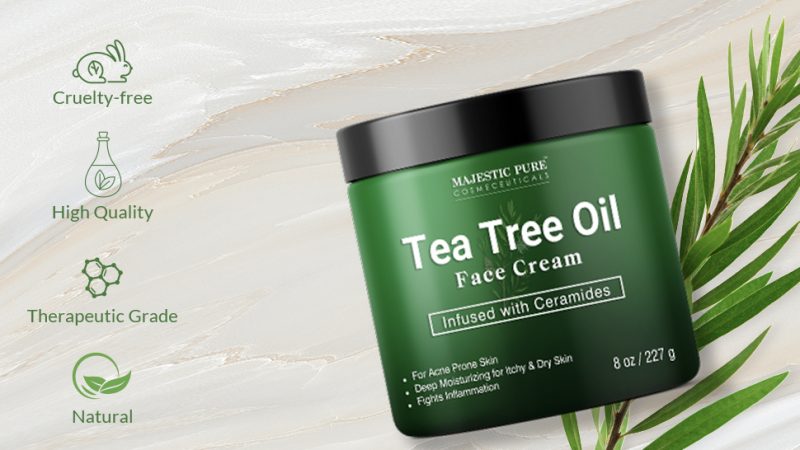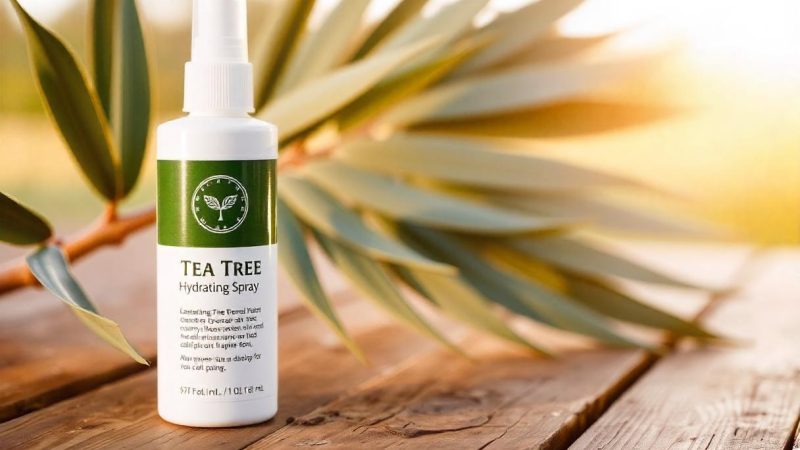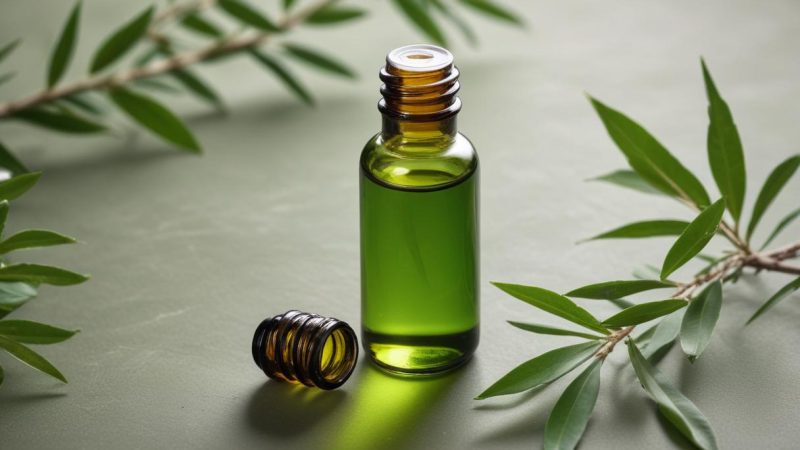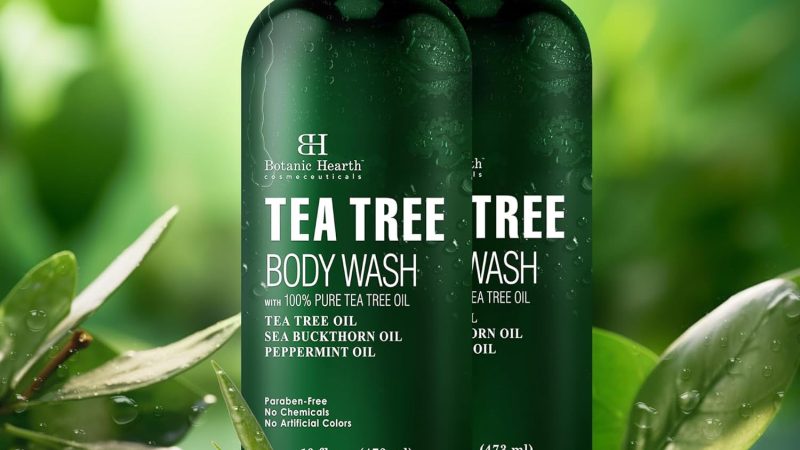Tea Tree Oil for Skin Care: How It Helps and Why You Should Use It

Tea tree oil, derived from the leaves of the Melaleuca alternifolia tree native to Australia, has become a popular natural remedy for various skin and scalp issues. Known for its powerful antimicrobial, anti-inflammatory, and soothing properties, it offers a range of benefits for different skin types and conditions. Let’s explore how tea tree oil can help with specific skin concerns and why it should be a part of your skincare routine.
1. Dry Skin and Eczema
Tea tree oil is an excellent natural remedy for soothing and moisturizing dry skin. Its anti-inflammatory properties help reduce redness and irritation caused by conditions like eczema. Eczema, characterized by red, flaky patches, can be alleviated by using tea tree oil mixed with a carrier oil like coconut or almond oil. The moisturizing effect of the carrier oil complements tea tree oil’s healing abilities, helping to lock in moisture and prevent further dryness.
A study published in the Journal of Dermatology found that tea tree oil’s anti-inflammatory action reduced the severity of eczema symptoms in patients when applied topically. It can calm inflamed skin and aid in the healing of damaged skin barriers.
How to Use:
Mix 2-3 drops of tea tree oil with a carrier oil, and apply to the affected area. Use regularly to help reduce symptoms of dryness and irritation.
2. Oily Skin
For those struggling with oily skin, tea tree oil is a beneficial solution. It helps regulate sebum production, preventing the skin from becoming excessively oily while maintaining hydration. The oil penetrates the pores, clears out blockages, and reduces excess oil without stripping the skin of its natural moisture.
Research suggests that tea tree oil may be as effective as benzoyl peroxide, commonly used in acne treatments, in controlling oily skin and acne breakouts. Its antibacterial properties also help reduce the risk of clogged pores, which are a leading cause of blackheads and whiteheads.
How to Use:
Add 2-3 drops of tea tree oil to your moisturizer or toner and apply it to your face daily. For targeted treatment, apply diluted tea tree oil directly to oily areas with a cotton swab.
3. Itchy Skin
Tea tree oil’s anti-inflammatory and antimicrobial properties make it effective for relieving itchy skin. Whether caused by dry skin, insect bites, or irritants, tea tree oil helps calm itching and reduce the urge to scratch. Its cooling effect also provides quick relief from discomfort, and its antifungal qualities help combat skin conditions like athlete’s foot and ringworm.
According to the American Academy of Dermatology, tea tree oil is a proven treatment for soothing and treating itchy skin caused by various conditions, including dermatitis and bug bites.
How to Use:
Dilute tea tree oil with a carrier oil, such as jojoba or olive oil, and gently massage it onto the affected area. Repeat as necessary to relieve itching.
4. Inflammation
Inflammation can be caused by various skin issues such as acne, rosacea, or allergic reactions. Tea tree oil has strong anti-inflammatory properties that reduce swelling and redness, making it a valuable treatment for inflamed skin. Its soothing nature calms the skin, while its antibacterial qualities ensure that any infection causing the inflammation is addressed.
A study published in the Journal of Clinical and Aesthetic Dermatology found that tea tree oil reduced inflammation in acne patients, resulting in a visible reduction in swelling and redness after consistent application.
How to Use:
Mix a few drops of tea tree oil with a carrier oil, and apply to the inflamed area twice daily to reduce redness and swelling.
5. Infections, Cuts, and Wound Healing
Tea tree oil has potent antibacterial and antifungal properties, making it an effective natural remedy for treating cuts, scrapes, and minor wounds. It helps prevent infections by killing bacteria and other harmful microorganisms that can cause wound-related infections. Additionally, its ability to reduce inflammation promotes faster wound healing.
Research published in Wounds journal supports the use of tea tree oil in wound care, noting its effectiveness in inhibiting bacteria that could otherwise lead to infection.
How to Use:
Clean the wound thoroughly, then apply a mixture of tea tree oil and a carrier oil directly to the affected area. Cover the wound with a clean bandage, and change it daily.
6. Hair and Scalp Treatment
Tea tree oil is not just beneficial for skin but also works wonders for hair and scalp health. Its antifungal and antimicrobial properties help combat dandruff, dry scalp, and even head lice. Regular use of tea tree oil can unclog hair follicles, moisturize the scalp, and improve blood circulation, promoting healthier hair growth.
A study published in the Journal of the American Academy of Dermatology showed that a 5% tea tree oil shampoo significantly reduced dandruff and scalp itchiness in participants after four weeks of use.
How to Use:
Add 5-10 drops of tea tree oil to your shampoo or conditioner and use it during each wash. Alternatively, mix tea tree oil with a carrier oil and massage it into your scalp, leaving it on for 15-20 minutes before rinsing.
7. Acne
Tea tree oil is widely recognized as a natural treatment for acne. Its antibacterial properties make it effective in targeting Propionibacterium acnes, the bacteria that cause acne. It also helps unclog pores, reducing the formation of new blemishes. Unlike many conventional acne treatments, tea tree oil does not strip the skin of moisture, making it ideal for those with sensitive or combination skin.
A clinical trial published in the Medical Journal of Australia found that tea tree oil was as effective as benzoyl peroxide in treating mild to moderate acne, with fewer side effects such as dryness or irritation.
How to Use:
Apply a diluted solution of tea tree oil (2-3 drops mixed with a carrier oil) to acne-prone areas using a cotton swab. For best results, apply it twice daily to reduce breakouts and prevent new acne from forming.
8. Psoriasis
Psoriasis is a chronic skin condition characterized by red, scaly patches, and it can be challenging to manage. Tea tree oil may help alleviate psoriasis symptoms by reducing inflammation and calming irritated skin. Its antibacterial properties can also help prevent secondary infections that sometimes accompany psoriasis flare-ups.
While tea tree oil is not a cure for psoriasis, its natural anti-inflammatory and antimicrobial properties can reduce the discomfort associated with the condition. Anecdotal evidence suggests that it helps soothe flare-ups and maintain smoother skin.
How to Use:
Dilute tea tree oil with a carrier oil and apply it to the affected areas. Use consistently during flare-ups for best results.
Final Thoughts
Tea tree oil is a versatile and powerful natural remedy for numerous skin and scalp issues, including dry skin, eczema, oily skin, inflammation, and acne. Its antimicrobial, anti-inflammatory, and healing properties make it a great addition to any skincare routine. However, it is important to always dilute tea tree oil with a carrier oil before applying it to your skin to prevent irritation, especially if you have sensitive skin.
As with any new skincare product, it is advisable to perform a patch test before regular use. If you experience any redness or irritation, discontinue use immediately and consult a dermatologist.
Sources:
- Hammer, K. A., Carson, C. F., & Riley, T. V. (2006). Antimicrobial Activity of Tea Tree Oil. Clinical Microbiology Reviews.
- Satchell, A. C., Saurajen, A., Bell, C., & Barnetson, R. S. C. (2002). Treatment of dandruff with 5% tea tree oil shampoo. Journal of the American Academy of Dermatology.
- Mayo Clinic. (2022). Tea Tree Oil: Overview and Benefits.
- Jandourek, A., Vaishampayan, J. K., & Vazquez, J. A. (1998). Efficacy of Melaleuca Alternifolia (Tea Tree) Oil in the Treatment of Tinea Pedis. Journal of the American Academy of Dermatology.
- Medical Journal of Australia. (1990). A Comparative Study of Tea Tree Oil Versus Benzoyl Peroxide in the Treatment of Acne.






